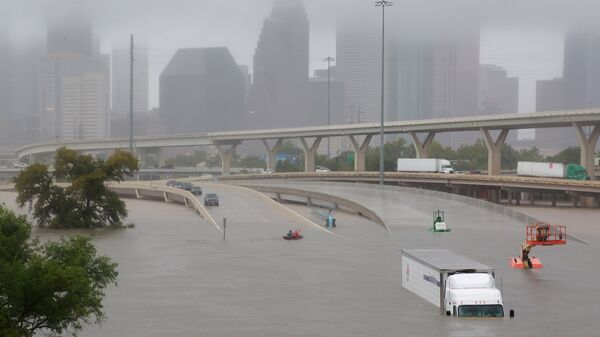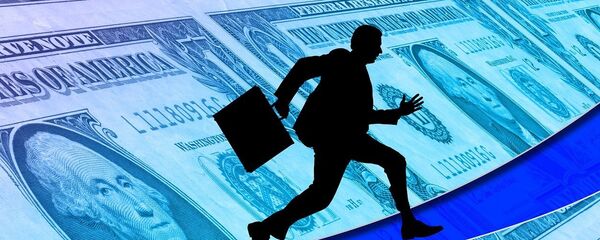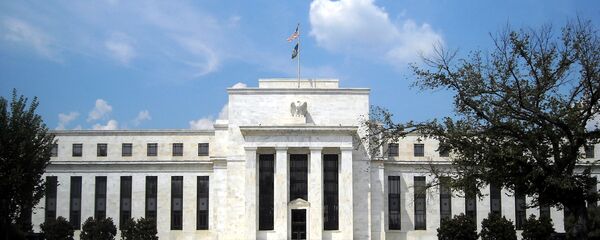Kristian Rouz – In line with the lowered GDP growth expectations following hurricanes Harvey and Irma, US private sector enterprises across the largest sectors of the economy took a blow as well. Although the hurricanes’ effects were limited to the US Gulf Coast, with the economic hubs of Florida and Texas being most severely affected, the downside consequences of the natural disasters have spread nationwide.
The hurricanes’ immediate effects included disruptions in Gulf Coast oil extraction and refining, with the losses passed on to the broader energy and utilities sectors. Additionally, insurance companies faced significant payoffs to their customers, while builders, retailers, lenders, and manufacturers were affected as well.
READ MORE: Traders Brace for Oil Price Gains as Hurricane Nate Makes Landfall on US Coast
More than half of all S&P 500-listed enterprises which reported Q3 earnings over the past few weeks said their business suffered losses. These companies include the chain retailer Costco, and Delta Airlines, among others.
Insurance enterprise American International Group said its estimated pre-tax losses amounted to at least $1 bln each from hurricanes Harvey and Irma.
In the non-financial sector, motorcycle-maker Harley Davidson reported a decline in it Q3 profits-per-share, which will affect company capitalization.
“We estimate the impact of the hurricanes accounted for approximately 1.5 to 2 percentage points of Harley-Davidson’s retail sales decline during the quarter,” the company’s Chief Financial Officer John Olin said.
At least 48 S&P 500 companies notified investors that their business would suffer from the lingering consequences of the storms.
In the construction sector, the negative effects of hurricanes added to the structural issues arising from a labor shortage, rising financing and refinancing costs, as well as sluggish demand for housing and real estate in general.
"We've already got a very volatile, super-pressurized, super-stretched industry, and just having natural disasters just adds to the pressure," Eric Holt of the University of Denver's Franklin L. Burns School of Real Estate & Construction Management said.
On the average, S&P 500 companies are expecting their non-GAAP profits-per-share to rise 4.2 percent in Q3, which would be the slowest pace of expansion this year. Meanwhile, insurers are only expected to see their profits decline by 63.3 percent.
READ MORE: Falling Figures: UK Labor Productivity Drops in Q2 as Economy Nears Stagnation
Meanwhile, the Federal Reserve said the hurricanes also disrupted manufacturing, as input costs increased due to storm-related complications in factory logistics, and the entailing shortage of raw materials.
In a broader sense, the recent hurricanes, wildfires and other natural disasters, including Mexico’s deadly earthquake, have exacerbated the threat of asset bubbles forming in the US financial sector. The poor performance of many companies, coupled with their rising stock value, exposes lenders to the hazard of issuing loans to possibly insolvent entities.
Meanwhile, economists expect a sharp rebound in corporate earnings and GDP growth in the fourth quarter, even though there is still a lot of uncertainty surrounding the post-hurricane rebuilding efforts.
“They were hurricanes of a massive size that caused significant disruption to labor forces and spending,” Phil Blancato of New York-based Ladenburg Thalmann Asset Management said. “But it’s a pendulum, early on it has an impact, but as the rebuild gets going and there’s an inventory ramp-up, I think it swings back the other way.”While the series of massive storms prompted hundreds of thousands to flee cities and made global news, the alarming trends in the US corporate sector, including the discrepancy between mediocre earnings and sky-high stock value, still go largely unnoticed by the general public.
According to a recent report from Pew Research, 59 percent of Americans say that private-sector enterprises make too much profit, while only 36 percent said the earnings of most companies are fair and reasonable.



